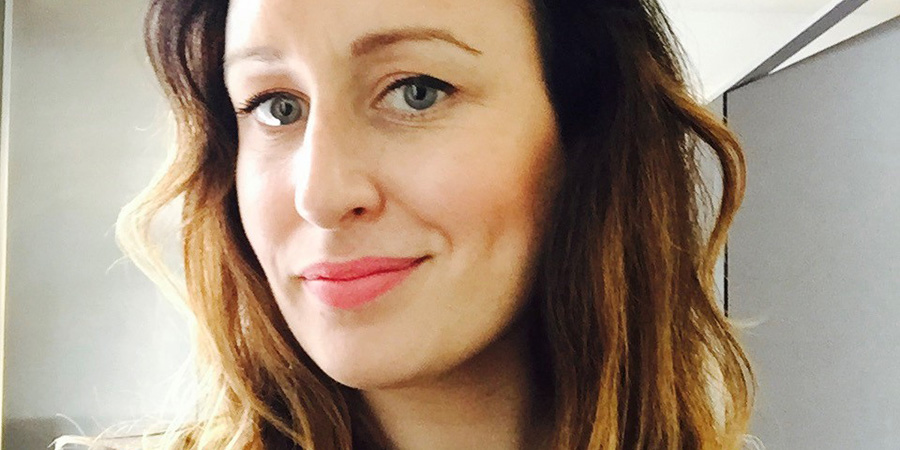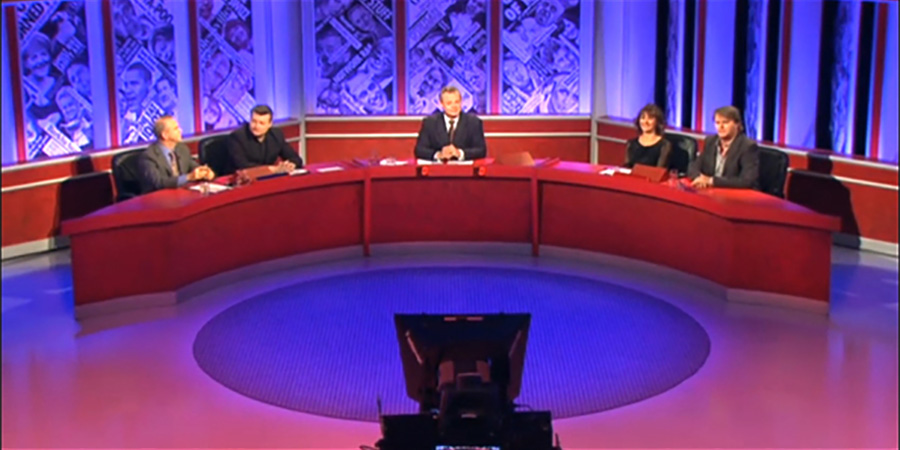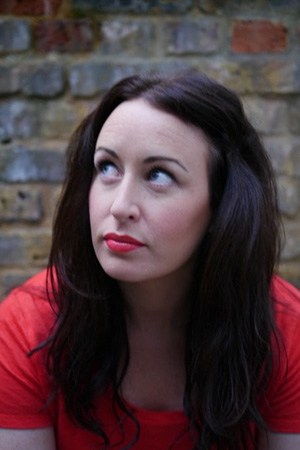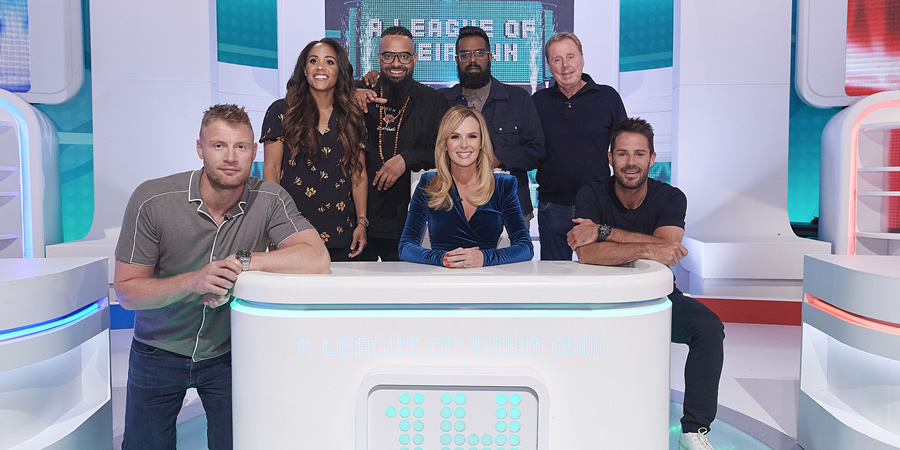My Comedy Career: Christine Rose

Over the last decade and a half you're likely to have seen the name 'Christine Rose' appearing in the end credits of many TV comedy shows. Here we chat to the prolific gag writer to find out how she got started, and what it is like to be a joke writer in the world of TV entertainment.
Tell us what you do in your job.
I'm a television comedy writer. It took me years to be able to say that. I thought people wouldn't believe it was a real job. Now I look at all the Instagram influencers and 'wellness' peddlers and think, what was I worried about?
I've been doing it around 15 years now so I've done some absolute gold and, if we're honest, a fair amount of bronze... but that's all part of the fun.
I've done chat shows (The Graham Norton Show, The Jonathan Ross Show, Chatty Man, etc). Panel shows (8 Out Of 10 Cats / Does Countdown, Have I Got News For You, A League Of Their Own, Never Mind The Buzzcocks, etc). Awards shows (Film and TV BAFTAs, The Brits, Royal Variety, Oliviers, GQ, British Fashion Awards, etc). Plus: Quiz shows, gameshows, magic shows, live shows, live magic shows, reality shows, clips shows, shiny floor shows, music shows, survival shows, dating shows, shows with kids in, lots of shows that never got past the pilot stage, and a BBC show that got taken off air for being rubbish (although I still stand by Don't Scare The Hare. It was one of my mum's friends' - who doesn't watch much TV - favourite shows, thank you).
I work in writers' rooms with others, just with the host/comedian, or alone, depending on how they want to do it.
There are a lot of misconceptions about the job. When people find out you write for other people they always go 'Oh I thought they were funny in their own right'. It's very annoying. 95% of people that do a lot of TV work have writers somewhere along the line, because of the volume of material needed to make a TV show and all the other jobs they are already doing.
You see half an hour of TV that took two and a half hours to record... Have I Got News For You takes 6-8 writers 3 days to write and edit all the material needed for the host's script. Does it make Katherine Ryan or David Mitchell any less funny or respected that they haven't written it all themselves? I don't think so. It just makes sense that they wouldn't have the time to do that.

How did you first get involved in the comedy industry?
By chance. Which isn't what people want to hear. They want to hear there was a clear path. That I went to comedy school and then did a degree in Laughter History at Cambridge where I was mentored in Footlights by Stephen Fry. But it was more likely that my parents moved house, and I started secondary school in Kent not knowing anyone, with a Cornish accent and looking like Lucy from Neighbours (the second Lucy). You learn to use your sense of humour pretty quickly to stop yourself getting kicked in by someone with a topknot called Lee-Anne. But I understand that is not very useful as career advice.
Then, after that, I worked in gaming. It was there a lovely work colleague gave my name to his friend at Zeppotron who was looking for new writers for a panel show. I did some try-outs and never really thought it would turn into anything. But they asked me back and I loved it. I turned down a job at Sony to try and be a comedy writer despite having only one contact, no money and no promise of any more work. If you really want it, sometimes you just have to jump in and see where it takes you.
What key skills do you need to be able to do your job well?
Well, you have to like making people laugh, and you have to like other people making you laugh.
You have to like playing with words and not get crushed if someone says they didn't like something.
You need to be confident enough to say thoughts out loud in a room full of people, but equally fine to work alone.
You're not the centre of attention. You have to be happy to be backstage, to give your best material and thoughts to other people and watch them get the laugh. If this upsets you in some way or you feel aggrieved by it, this probably isn't the job for you.

What has been your biggest career achievement to date?
Being one of the first regular female writers in the Have I Got News For You writers' room. My dad loved that show so him seeing my name on the credits for the first time was really great.
Writing the TV BAFTAs for the first time was daunting but really enjoyable and last year I wrote the film BAFTAs with my good friend Shaun Pye. We have a lot of fun writing together so that's definitely up there. Robert De Niro was watching the monologue on a monitor backstage and laughing so that was good. Al Pacino... not so much.
And what has been the biggest challenge/disappointment?
I don't like it when famous people go bad. 'Celebrity' is such a strange thing. Some people take it on with real class and others let it engulf them and turn them into monsters. I refuse to buy into thinking you are better than everyone else just because you are on TV. It's a nonsense.
I deal with it by reasoning they may have issues they are dealing with and not to take it personally. And by storing their names in my Filofax for the book I will release on my deathbed called Oh No! They're Not a C*** Too Are They?.
Realising there will always be someone with something horrible to say about your work. I don't necessarily mind reading negative comments because people are free to think what they want. That's the whole thing about comedy, there's different styles for different tastes.
Some people were annoyed that Graham Norton's Film BAFTA monologue was nothing like Ricky Gervais's Golden Globes one. But it wasn't trying to be. That isn't Graham's style nor would it have gone down well with the BBC and BAFTA, and that's what the job is.
People often think writers have a lot more say in the jokes that end up on screen than they actually do. Particularly for big awards shows. Once the script has gone through the host, the channel, the production company (producers, execs), PR and lawyers, jokes often get changed beyond recognition. There is a lot of internal politics that people never see and never think about when they're shouting 'SACK THE WRITERS!' on Twitter. I think, one day, we should get all the 'sack the writers' people together in a room and see what they can come up with and how much survives a production meeting with 15 people in it - not so easy now, is it Karen?
Talk us through a typical day.
If I'm in a writers' room the day goes: Coffee, gossip, chat about murders in the news, work, lunch chat, work, lunch, analysis of lunch, work, home. When you're stuck in one room all day you develop an absolute obsession with lunch. In the 8 Out Of 10 Cats writers' room we have an encyclopaedic knowledge of the menus and eateries of the Shepherd's Bush area.
Also, comedy writer is a more sedentary job than a long distant lorry driver (probably) and you can get really bad what I call 'writers' middle', so exercise and get a good chair. Production offices just stick writers wherever they can for the day, but now I categorically refuse to work all day sat on a bar stool or a beanbag. You need lower back support.

Tell us a trick/secret/resource that you use to make your job quicker/easier.
I often use a little secret resource called 'Wikipedia'. You may not have heard of it but it is very useful when you are in a hurry and don't need facts to be true.
Don't be snobby about newspapers. I read all of them and anything. I've even read City AM. They are great sources for jokes. It's limiting to only read things that echo your political views.
How are you paid?
TV comedy writers are nearly always freelance and get paid by the day. In America you usually get contracted onto one job (e.g. a talk show) for its duration, but as writing teams and budgets are a lot smaller here a show will normally only book you for individual days when they need you.
The benefit of this is, if you can get enough work, then you can do lots of different shows at the same time. Which is great for experience and keeping things interesting. The downside is, if you can't get enough work, you worry you'll have to go and work in a normal office environment again... which cannot happen, as you are now completely feral.
When you start out you won't be paid very much. Unfortunately, it's a ladder and you are at the bottom. The money increases with time and experience. I had several other jobs that supplemented my income until I became a full-time TV writer.
A show's interactive services (websites, social media, etc) are sometimes a good place for writers to get paid for working on a TV show even if it isn't necessarily jokes for the host. I did several years editing the Big Brother website up at Elstree and it was brilliant. It was run like a 24 hour news room and it taught me a lot about how TV is made.
An agent really helps in terms of negotiating money on your behalf. Unless you are a psychopath you will find negotiating your own worth excruciating. But don't fall into the trap of expecting an agent to get you work. That is down to you.
There are a million things an agent does for writers, they will take calls and answer emails about jobs, negotiate contracts, set up meetings, send invoices, chase people, collect money, pay you, advise you, and, if you have a nice one, get drunk with you and listen to you moaning. But the majority of your work will not be magicked up by them. And if you think that it will then you will be very disappointed.

If you could change one thing about the comedy industry, what would it be?
The lack of women and minority groups in writers' rooms is pretty shameful.
Personally, I don't think it's helpful to send the message that TV writers' rooms are toxic hellholes that hate women because I don't think they are these days and I believe it stops more women from trying to get into them.
It does help if you are not easily offended, but that just goes for people in general I find. However, the numbers would suggest there is something going against women progressing in this field.
Producers just want to get a show made and are often under financial and time pressures, so they don't always have the luxury of trying out new people. Ideally more shows would reserve time and some budget to try to find new talent alongside getting the show made, but this needs to be driven by the channels and the production companies.
It needs to be more inclusive to people of all backgrounds, less mysterious in terms of how you get a break, and proper submission processes to open it up.
I hate the word 'mentoring' but feedback is necessary to explain why jokes aren't working or aren't useable. For me it was essential to improving and progressing.
What tips would you give for anyone looking to work in your area of the industry?
TV shows just want people that can write useable jokes quickly. They don't care what degree you did or whether you have clowning skills or are in an improv troupe. You don't need to have done stand-up. In many ways I think it can help that you haven't developed a distinct style of your own. You just need to practice writing jokes.
Topical jokes are probably the most sought-after as they get old very quickly and those shows need a constant supply (also see radio comedy). Try and write them as short as possible.
Most importantly, think about who is saying the joke (their style) and where it will be used (time of show, channel etc). If you want to write for a particular show then look at what jokes they do and try to write in that style. I mean, it's great that you've just written an eye-wateringly mean roast joke but do they want that on The One Show?





